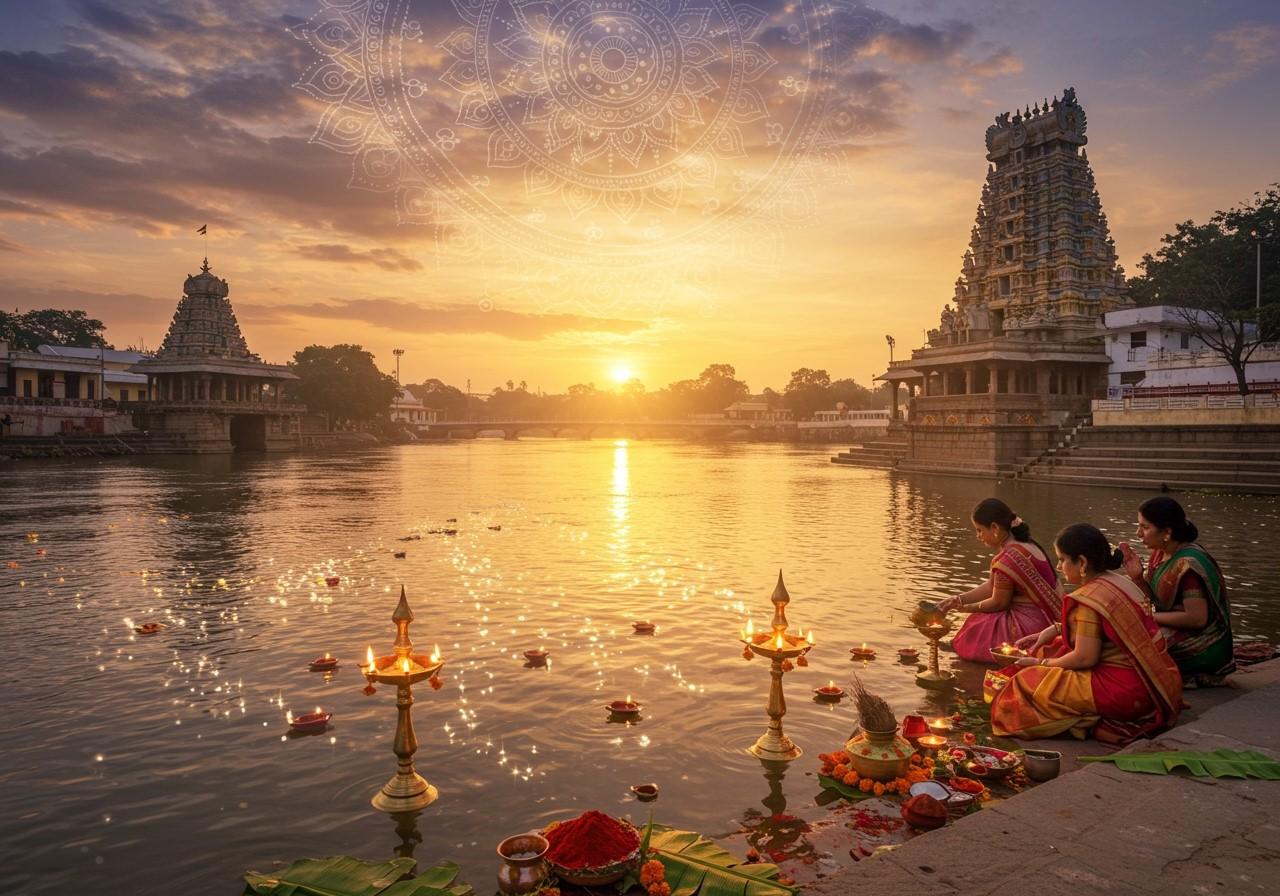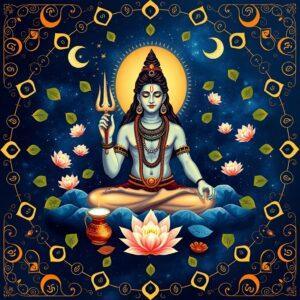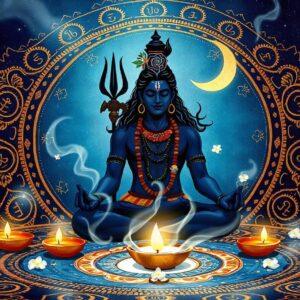
Kaveri Sankramana holds deep cultural and religious significance for many Indians. This sacred event celebrates the emergence of the holy river Kaveri from the Brahmagiri hills in Karnataka. The festival is observed with great reverence, highlighting the spiritual importance of water bodies in Indian culture. This guide delves into the significance, rituals, and ways to celebrate Kaveri Sankramana, offering a deeper understanding of this sacred transition.
Understanding Kaveri Sankramana
Kaveri Sankramana is a spiritual festival commemorating the descent of the Kaveri river to the earth. Celebrated annually in October, it coincides with the sun’s entry into the Libra zodiac sign. The festival’s mythology centers around Goddess Kaveri appearing to cleanse the sins of her devotees. Primarily celebrated in Karnataka’s Coorg region, the river’s birthplace, Kaveri Sankramana emphasizes spiritual merit and purification through ritual bathing in the holy waters. It is a time for prayer, introspection, and community connection.
Rituals and Traditions of Kaveri Sankramana
The rituals of Kaveri Sankramana are steeped in cultural meaning. Devotees congregate at Talakaveri, the river’s origin point, to witness the emergence of the sacred spring. This auspicious moment is accompanied by hymns, floral offerings, and incense presented to the river goddess. The ceremonial bath is a central ritual, believed to purify the body and soul. Families prepare special meals, sharing them with their community and those in need, emphasizing charity and togetherness. Traditional music and dance performances enrich the festivities, showcasing the cultural heritage interwoven with the river.
Kaveri Pushkaram: A Reverent Celebration of the Sacred River
Kaveri Pushkaram, a significant event related to the Kaveri River, occurs every 12 years. This 13-day festival, coinciding with Jupiter’s transit into Tula (Libra), is a time of profound spiritual importance for devotees, especially in Karnataka and Tamil Nadu. As part of the broader Indian Pushkaram tradition, which honors 12 important rivers based on Jupiter’s zodiacal position, Kaveri Pushkaram underscores the river’s sacredness.
During Kaveri Pushkaram, devotees gather along the riverbanks for rituals, prayers, and cultural activities. Mass prayers express gratitude and seek blessings from the river goddess, while ceremonial bathing offers spiritual cleansing and renewal. Traditional music and dance performances add vibrancy to the festival, celebrating the river’s role in sustaining life and culture. Kaveri Pushkaram promotes environmental awareness, often involving community river clean-up initiatives. This blend of spiritual devotion and ecological responsibility strengthens the connection between humans and nature.
Modern technology has extended the reach of Kaveri Pushkaram. With increasing urbanization, many participate in virtual rituals, connecting with the festivities remotely through online platforms that offer puja services. This integration of tradition and modernity ensures the festival’s continued relevance, allowing devotees to honor cultural heritage while adapting to contemporary lifestyles.
How Poojn.in Helps You Celebrate Kaveri Sankramana
Poojn.in simplifies your Kaveri Sankramana preparations by delivering all essential puja items right to your doorstep. As India’s leading Dashakarma bhandar, we offer authentic ritual materials for this sacred occasion.
For Kaveri Sankramana, Poojn.in provides:
- Pure copper kalash for water offerings, essential for traditional rituals.
- Fresh turmeric (haldi) for ritual use, adding auspiciousness to the ceremonies.
- Traditional cotton wicks for deepam, symbolizing light and knowledge.
- Pure ghee for lamp lighting, representing purity and devotion.
- Authentic kumkum and chandan, traditional offerings for the deities.
- Fresh flowers and garlands (subject to location), enhancing the beauty of the puja.
- Puja thali sets in brass and copper, providing a dedicated space for offerings.
- Incense sticks and dhoop, creating a sacred atmosphere.
Our products are sourced from trusted vendors using traditional methods and undergo rigorous quality checks to ensure ritual purity. Detailed product descriptions are available in multiple languages, and our customer support assists you in selecting the right items. Order online at www.poojn.in or through our mobile app for convenient home delivery across India. We maintain year-round stock of essential items, allowing you to prepare in advance. Note: Delivery times may vary by location. Please order well ahead of the festival date.
Paddy, Chand Mala, Camphor Powder, Cotton Thread, Black Sesame, Sandalwood Incense Sticks, and more are available on poojn.in for your Kaveri Sankramana puja.
Embracing Tradition and Modernity in Kaveri Sankramana
Kaveri Sankramana beautifully blends tradition and modernity, representing cultural continuity and adaptation. Whether families gather by the river or connect remotely, the spirit of devotion endures. The festival emphasizes the river’s sacred role and the importance of environmental stewardship. Through the flowing waters of Kaveri or online rituals, this celebration unites communities, strengthening the timeless connections between nature, community, and spirituality. Kaveri Sankramana honors the past while embracing the future.
FAQs on Kaveri Sankramana
What is Kaveri Sankramana? Kaveri Sankramana is a sacred festival marking the transition of the Kaveri River from its source in Kodagu, Karnataka, a significant event for devotees.
When is it celebrated? Kaveri Sankramana is typically celebrated in mid-October, with the exact date varying annually according to the Hindu lunar calendar.
Why is it important? Kaveri Sankramana holds religious and cultural importance, symbolizing the blessings of the river goddess Kaveri and promising prosperity and purification.
How is it observed? Devotees participate by taking a holy dip in the river, performing rituals, offering prayers, conducting special pujas, and sharing traditional meals.
Where does it take place? The main celebrations are centered at Talakaveri in Kodagu, Karnataka, the birthplace of the Kaveri River and a significant pilgrimage site.
What rituals are performed? Rituals include offerings of flowers and fruits to the river, special prayers, lamp lighting, community feasts, and charitable acts.
Can anyone participate? Yes, people from all regions and communities are welcome to participate in the festivities and seek blessings.
Are there any traditional items needed? Traditional items such as flowers, fruits, turmeric, and lamps are commonly used in rituals, and many find it convenient to purchase these online.
Learn more about Kalyana Venkateswara Temples: A Complete India Pilgrimage Guide, Srinivasa Mangapuram Guide, Narayanavanam Guide, Divine Significance, and Puja at Home Guide.


